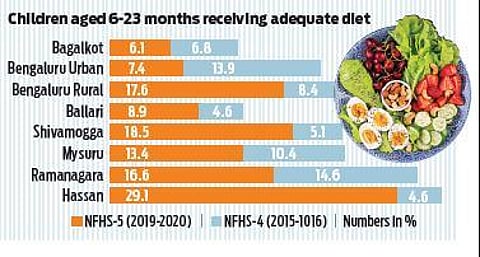

BENGALURU: It is shocking to say the least. The ‘IT Capital of India’ has only 7.4 per cent of children in the 6-23 month age group receiving adequate, nutritional diet in 2019-2020, reveals the districtwise sheet of National Family Health Survey-5 (NFHS-5). The survey stated that the present figures are worse than what they were five years ago (in 2015-2016 under NFHS-4), when 13.9 per cent of children under the age group receiving adequate diet. Experts said the numbers are shocking and advised the government to carry out awareness campaigns on nutritional food required for children.
According to the Optimal Infant and Young Child Feeding (IYVF) practices, the children in the 6-23 month age group should be given complementary foods along with breastfeeding to meet the diet requirement.
Apart from breastfeed, children are required to consume four more food groups. Group one includes grains, roots, tubers, legumes and nuts; Group 2 has dairy products; Group 3 includes eggs, while Group 4 has fruits and vegetables that are vitamin A rich. Dr Sylvia Karpagam, a public health doctor and researcher, said, “Children who are six to eight months old and are breastfed also require two meals from the IYVF group. Children in the 9-23 month age group require three meals per day along with breastfeeding.”
‘Govt must subsidise healthy food prices’
“Those in the non-breastfed group require four meals. But many children are not given healthy foods, like grains, dairy products or even fresh food. Parents think that it is not required and opt for packaged baby food products that are not nutritious,” said Dr Sylvia Karpagam. She said that many parents tend not to give animal food to children, thinking that they cannot eat since they are young. “Animal food is essential as it has enough nutritional factors. The meals supplied by the government does not include eggs, which hold great nutritional value.”
Dr Shaibya Saldanha, a consultant gynaecologist obstetrician, said the cost of living and lack of education are the factors that are preventing children from getting adequate diet. “The cost of nutritional food, such as meat, fish, eggs, milk, fruits and vegetables, has increased. Also, the other reason is that working women are not getting enough time to cook nutritious food.”
She said the government should subsidise the prices of nutritional foods and provide a storage system to stock fruits and vegetables that are otherwise thrown away in markets as these can be consumed by children from poor families.
The city also saw a rise in the percentage of children in the 6-59 month age group being anaemic from 51.7 per cent in NHFS4 to 58.9 per cent now. Even the number of children under five years who are stunted has increased from 28.1 per cent to 31.3 per cent and children under five years who are underweight from 26.8 per cent to 28.1 per cent. Breastfeeding children in the 6-23 month group receiving an adequate diet is down to 4.8 per cent from 13.9 per cent in NHFS4. But in many other aspects, Bengaluru has fared well, like in antenatal checkups in trimester where it has achieved 75.3 per cent as against 51.4 per cent earlier. Even in child vaccinations and Vitamin A supplementation, its results range between 65 and 95.4 per cent.